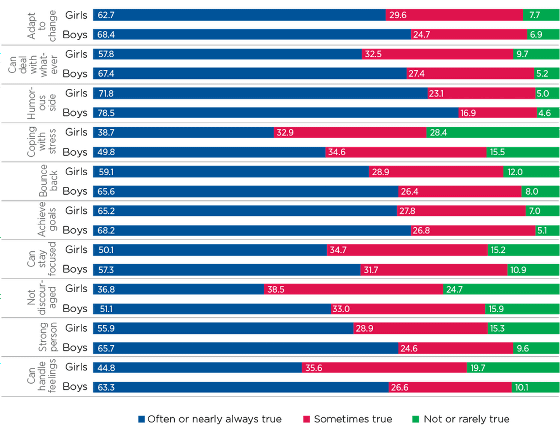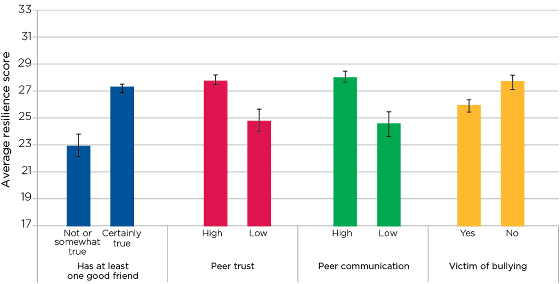Children without friends have less “resilience” important to happiness

by
Recent studies have shown that more important than happiness is “resilience” that is hard to beat. A large study in Australia reports that boys and girls with at least one close friend are more resilient and more resilient than boys and girls without any close friends.
Adolescents' resilience | Australian Institute of Family Studies
https://aifs.gov.au/publications/adolescents-resilience
Teens with at least one close friend can better cope with stress than those without
https://theconversation.com/teens-with-at-least-one-close-friend-can-better-cope-with-stress-than-those-without-126769
The study was part of a large project that followed 10,000 Australian children for years. The project started in 2004, and in 2016, older children at the beginning of the project grew to 16-17 years old. “One of the key elements for a child's well-being is“ resilient ”to bounce back stress and learn and grow from it,” researchers at the Australian Family Institute look into children ’s resilience. We conducted interviews as much as possible.
The causes of stress vary from everyday things such as losing sports games and poor test results to more serious ones, such as family collapse, illness, death of close friends, and bullying. According to the researcher, the survey showed that the overall trend was that boys showed signs of resilience more than girls, and that there was a close friend and high resilience score That.
Previous studies have shown that individual resilience depends on a variety of factors, including biological factors, physical characteristics, relationships with family and friends, and the environment of schools and local communities. In this survey, the children who are test subjects are self-assessed with a score between 0 and 40 such as “ability to accept change”, “ability to achieve goals even with disabilities”, “how affected by failure” Evaluated. The higher the score, the higher the resilience.

by
The result showed that the overall resilience score average was 26.5 points, the boy average was 27.6 points, and the girl average was 25.5 points. A closer look revealed the following.
・ 51% of boys answered that they are less susceptible to failure and 37% of girls.
・ 63% of boys answered that they can control unpleasant emotions and 45% of girls.
・ 50% of boys affirmed the sentence “Handling stress well makes you stronger” and 39% of girls.
・ 67% of boys feel 58% of girls feel that they can usually manage anything.

I showed that boys have higher resilience to stress than girls, but this is also because boys want to show that `` I am strong against stress '' The On the other hand, even in the past of the study, those that show the height of the boy's resilience
Of the boys and girls aged 16-17 who conducted interviews, 84% answered that they had at least one good friend. The average resilience of the children who responded like this was 27 points, while the average resilience of the remaining 16% of the children who did not have close friends was 23 points. . Researchers say this is a statistically significant difference.
The nature of friendship is also important. “The boys and girls who trust friends at a high level are 3 points more resilient than boys and girls who do not trust”, and “boys and girls who said that they were able to communicate well with friends It is also shown that the resilience is 3.5 points higher than other boys and girls.

Behind the scenes is “becoming a victim of bullying”. Boys and girls who replied that they were bullyed over the past 12 months were less resilient by 2 points than boys and girls who did not. However, 'no good friends' has been shown to have a negative impact on children's resilience rather than bullying.
Of course, children's resilience is greatly related to their relationships with their families. It was found that children who answered “no support from family” at the age of 10 to 13 were significantly less resilient at the age of 16 to 17. “The lack of family support means that there are no trusted people in the family that boys and girls can immediately discuss anxiety and pain,” the researcher said.
From this study, we cannot conclude whether there is “no resilience because there is no resilience” or “no resilience because there is no close friend”. However, researchers stress that the lack of close friends makes boys and girls vulnerable.

by Sharon McCutcheon
Resilience will change in relation to the people around you. For this reason, it is possible to increase resilience by placing boys and girls in different situations. Researchers advise that those who are involved with children can make a difference in their lives by helping them and making friends.
Related Posts:
in Science, Posted by darkhorse_log







